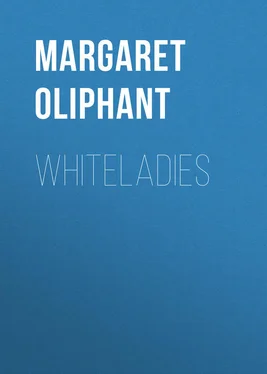Margaret Oliphant - Whiteladies
Здесь есть возможность читать онлайн «Margaret Oliphant - Whiteladies» — ознакомительный отрывок электронной книги совершенно бесплатно, а после прочтения отрывка купить полную версию. В некоторых случаях можно слушать аудио, скачать через торрент в формате fb2 и присутствует краткое содержание. ISBN: , Жанр: foreign_prose, на английском языке. Описание произведения, (предисловие) а так же отзывы посетителей доступны на портале библиотеки ЛибКат.
- Название:Whiteladies
- Автор:
- Жанр:
- Год:неизвестен
- ISBN:http://www.gutenberg.org/ebooks/52388
- Рейтинг книги:5 / 5. Голосов: 1
-
Избранное:Добавить в избранное
- Отзывы:
-
Ваша оценка:
- 100
- 1
- 2
- 3
- 4
- 5
Whiteladies: краткое содержание, описание и аннотация
Предлагаем к чтению аннотацию, описание, краткое содержание или предисловие (зависит от того, что написал сам автор книги «Whiteladies»). Если вы не нашли необходимую информацию о книге — напишите в комментариях, мы постараемся отыскать её.
Whiteladies — читать онлайн ознакомительный отрывок
Ниже представлен текст книги, разбитый по страницам. Система сохранения места последней прочитанной страницы, позволяет с удобством читать онлайн бесплатно книгу «Whiteladies», без необходимости каждый раз заново искать на чём Вы остановились. Поставьте закладку, и сможете в любой момент перейти на страницу, на которой закончили чтение.
Интервал:
Закладка:
M. Austin, the shopkeeper, took off his cap to her, and answered “Oui, madame,” blandly; then, with that instant perception of her nationality, for which the English abroad are not always grateful, he added, “Madame is Inglese? we too. I am Inglese. In what can I be serviceable to madame?”
“Oh, you understand English? Thank heaven!” said Miss Susan, whose French was far from fluent. “I am very glad to hear it, for that will make my business so much the easier. It is long since I have been abroad, and I have almost forgotten the language. Could I speak to you somewhere? I don’t want to buy anything,” she said abruptly, as he stood aside to let her come in.
“That shall be at the pleasure of madame,” said the old man with the sweetest of smiles, “though miladi will not find better damask in many places. Enter, madame. I will take you to my counting-house, or into my private house, if that will more please you. In what can I be serviceable to madame?”
“Come in here – anywhere where we can be quiet. What I have to say is important,” said Miss Susan. The shop was not like an English shop. There was less light, less decoration, the windows were half blocked up, and behind, in the depths of the shop, there was a large, half-curtained window, opening into another room at the back. “I am not a customer, but it may be worth your while,” said Miss Susan, her breath coming quick on her parted lips.
The shopkeeper made her a bow, which she set down to French politeness, for all people who spoke another language were French to Miss Susan. He said, “Madame shall be satisfied,” and led her into the deeper depths, where he placed a chair for her, and remained standing in a deferential attitude. Miss Susan was confused by the new circumstances in which she found herself, and by the rapidity with which event had followed event.
“My name is Austin too,” she said, faltering slightly. “I thought when I saw your name, that perhaps you were a relation of mine – who has been long lost to his family.”
“It is too great an honor,” said the old shopkeeper, with another bow; “but yes – but yes, it is indeed so. I have seen already another gentleman, a person in the same interests. Yes, it is me. I am Guillaume Austin.”
“Guillaume?”
“Yes. William you it call. I have told my name to the other monsieur. He is, he say, the successive – what you call it? The one who comes – ”
“The heir – ”
“That is the word. I show him my papers – he is satisfied; as I will also to madame with pleasure. Madame is also cousin of Monsieur Farrel? Yes? – and of me? It is too great honor. She shall see for herself. My grandfather was Ingleseman – trés Inglese. I recall to myself his figure as if I saw it at this moment. Blue eyes, very clear, pointed nose – ma foi! like the nose of madame.”
“I should like to see your papers,” said Miss Susan. “Shall I come back in the evening when you have more time? I should like to see your wife – for you have one, surely? and your children.”
“Yes, yes; but one is gone,” said the shopkeeper. “Figure to yourself, madame, that I had but one son, and he is gone! There is no longer any one to take my place – to come after me. Ah! life is changed when it is so. One lives on – but what is life? a thing we must endure till it comes to an end.”
“I know it well,” said Miss Susan, in a low tone.
“Madame, too, has had the misfortune to lose her son, like me?”
“Ah, don’t speak of it! But I have no son. I am what you call a vile fee,” said Miss Susan; “an old maid – nothing more. And he is still living, poor boy; but doomed, alas! doomed. Mr. Austin, I have a great many things to speak to you about.”
“I attend – with all my heart,” said the shopkeeper, somewhat puzzled, for Miss Susan’s speech was mysterious, there could be little doubt.
“If I return, then, in the evening, you will show me your papers, and introduce me to your family,” said Miss Susan, getting up. “I must not take up your time now.”
“But I am delighted to wait upon madame now,” said the old man, “and since madame has the bounty to wish to see my family – by here, madame, I beg – enter, and be welcome – very welcome.”
Saying this he opened the great window-door in the end of the shop, and Miss Susan, walking forward somewhat agitated, found herself all at once in a scene very unexpected by her, and of a kind for which she was unprepared. She was ushered in at once to the family room and family life, without even the interposition of a passage. The room into which this glass door opened was not very large, and quite disproportionately lofty. Opposite to the entrance from the shop was another large window, reaching almost to the roof, which opened upon a narrow court, and kept a curious dim day-light, half from without, half from within, in the space, which seemed more narrow than it need have done by reason of the height of the roof. Against this window, in a large easy chair, sat an old woman in a black gown, without a cap, and with one little tail of gray hair twisted at the back of her head, and curl-papers embellishing her forehead in front. Her gown was rusty, and not without stains, and she wore a large handkerchief, with spots, tied about her neck. She was chopping vegetables in a dish, and not in the least abashed to be found so engaged. In a corner sat a younger woman, also in black, and looking like a gloomy shadow, lingering apart from the light. Another young woman went and came toward an inner room, in which it was evident the dinner was going to be cooked.
A pile of boxes, red and blue, and all the colors of the rainbow, was on a table. There was no carpet on the floor, which evidently had not been frotté for some time past, nor curtains at the window, except a melancholy spotted muslin, which hung closely over it, making the scanty daylight dimmer still. Miss Susan drew her breath hard with a kind of gasp. The Austins were people extremely well to do – rich in their way, and thinking themselves very comfortable; but to the prejudiced English eye of their new relation, the scene was one of absolute squalor. Even in an English cottage, Miss Susan thought, there would have been an attempt at some prettiness or other, some air of nicety or ornament; but the comfortable people here (though Miss Susan supposed all foreigners to be naturally addicted to show and glitter), thought of nothing but the necessities of living. They were not in the least ashamed, as an English family would have been, of being “caught” in the midst of their morning’s occupations. The old lady put aside the basin with the vegetables, and wiped her hands with a napkin, and greeted her visitor with perfect calm; the others took scarcely any notice. Were these the people whose right it was to succeed generations of English squires – the dignified race of Whiteladies? Miss Susan shivered as she sat down, and then she began her work of temptation. She drew forth her picture, which was handed round for everybody to see. She described the estate and all its attractions. Would they let this pass away from them? At least they should not do it without knowing what they had sacrificed. To do this, partly in English, which the shopkeeper translated imperfectly, and partly in very bad French, was no small labor to Miss Susan; but her zeal was equal to the tax upon it, and the more she talked, and the more trouble she had to overcome her own repugnance to these new people, the more vehement she became in her efforts to break their alliance with Farrel, and induce them to recover their rights. The young woman who was moving about the room, and whose appearance had at once struck Miss Susan, came and looked over the old mother’s shoulder at the picture, and expressed her admiration in the liveliest terms. The jolie maison it was, and the dommage to lose it, she cried: and these words were very strong pleas in favor of all Miss Susan said.
Читать дальшеИнтервал:
Закладка:
Похожие книги на «Whiteladies»
Представляем Вашему вниманию похожие книги на «Whiteladies» списком для выбора. Мы отобрали схожую по названию и смыслу литературу в надежде предоставить читателям больше вариантов отыскать новые, интересные, ещё непрочитанные произведения.
Обсуждение, отзывы о книге «Whiteladies» и просто собственные мнения читателей. Оставьте ваши комментарии, напишите, что Вы думаете о произведении, его смысле или главных героях. Укажите что конкретно понравилось, а что нет, и почему Вы так считаете.












